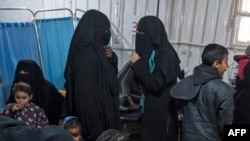U.N. investigators are calling on countries to repatriate thousands of children and mothers associated with Islamic State fighters interned in Syria’s Al-Hol displacement camp. The U.N. Commission of Inquiry on Syria has released its latest report.
About 70,000 people, the vast majority women and children under the age of 12, are languishing at the Al-Hol camp. They fled there after the Islamic State stronghold of Deir al-Zor was captured by the U.S.-led international coalition and the Kurdish-led Syrian Democratic Forces (SDF).
The three-member U.N. Commission of Inquiry on Syria says thousands of children above the age of 12, who are considered to be of fighting age, are being held in incommunicado detention by the SDF.
Commission Chairman Paulo Pinheiro says the children are being kept in a secret location with adults suspected of being fighters for IS, and in conditions that may give rise to torture or ill-treatment.
“We find very bizarre this limit of 12. One-hundred-ninety-one member states have ratified the Convention of the Rights of the Child and the children from 12 to 18, they are children and adolescents ... considered terrorists if they are more than 12 years old. The Commission finds this completely appalling," said Pinheiro.
The Commission says countries are fearful of repatriating mothers who were involved with IS militants. At the same time, it says allowing the children born of these relationships to fester in the camps would render them stateless, which violates international law.
Commission member, Hanny Megally, tells VOA the risks of not repatriating these children will have serious consequences for them and society as a whole.
“At a time when we are saying we want not just to defeat armed terrorists, but also to deal with the root causes as to why people are radicalized to violence, we ought to be looking at not creating more grievances that may in the future create another generation of people who have grievances against us, and against the people living in their own communities and environment," said Megally.
Megally says countries should move away from policies that favor punishment for those linked with IS and move toward rehabilitation. He says peoples’ circumstances differ and tarring everyone with the same brush is a big mistake.
He says the best solution needs to be one that allows people to go back and be dealt with in their own countries. He says Western nations have judicial systems that can cope with this.





